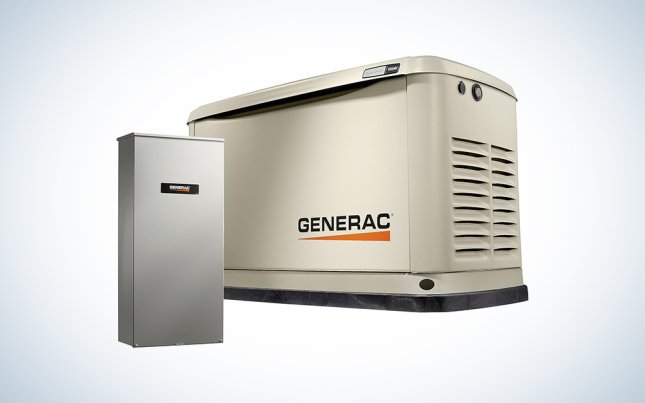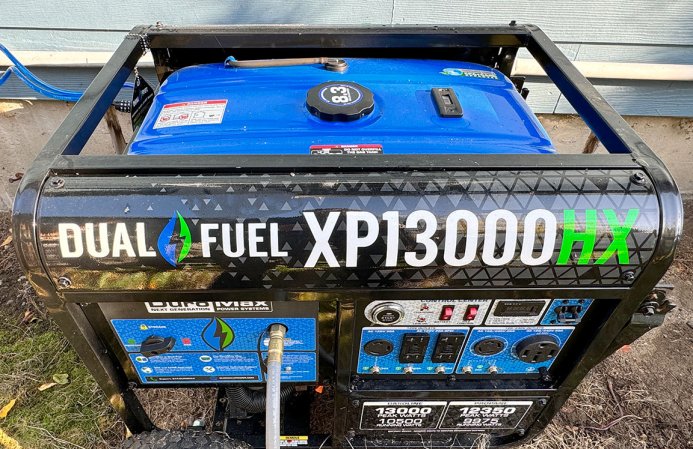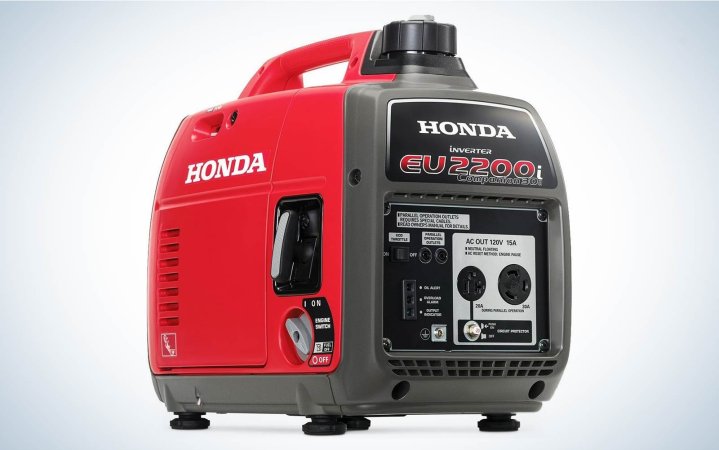We may earn revenue from the products available on this page and participate in affiliate programs. Learn more ›

A home generator can fall anywhere between useful and downright essential for any number of reasons. Maybe you live someplace plagued by frequent winter storms and their resulting blackouts, and you need to be able to keep the lights on and the fridge running in a pinch. Or maybe you rely on lifesaving medical equipment like a CPAP machine and can’t run the risk of having it cut out. Maybe you live in a hot region that experiences utility brownouts in the summer, and you need to be able to keep the AC going. Or perhaps you simply want a mobile power source around the house to use with tools and whatnot. Whatever the case, you’ll find the best generators for homes—like our best overall, the Generac 7228 18kW Guardian—to suit a variety of purposes.
- Best overall: Generac 7228 18kW Guardian
- Best dual-fuel: DuroMax XP 13000HX Dual-Fuel Portable Generator
- Best portable: Honda EU2200i Companion Portable Generator
- Best portable power station: Goal Zero Yeti PRO 4000
- Best solar: Jackery Explorer 2000 Plus Solar Generator
- Best for versatility: Segway Cube 2000
- Best budget: Wen DF475T Dual Fuel Generator
How we chose the best generators for homes
As an unrepentant gear junkie and general tech obsessive, I’ve had a chance to use a lot of generators—big to small. What’s more, having spent some 40 years living in the windy, rainy Pacific Northwest, I’ve had to wield said generators under various conditions, from short power blinks to weeklong outages, so I know what constitutes a reliable backup power source. Equipped with this experience, I have spent over a decade reviewing generators and other gear for outlets like Popular Science, Popular Mechanics, the Daily Beast, Thrillist, and more. If I arrived at split decisions for a particular category, I looked to input from my fellow experts, as well as reviews from real-world buyers to break the tie.
The best generators for homes: Reviews & Recommendations
These generators span a variety of formats, budgets, intentions, and power needs. Some are fairly portable, others can be moved with a bit more effort, and others still are more or less designed to stand in one place. Regardless, each was chosen for delivering reliable performance and rates among the best generators for homes in 2024.
Best overall: Generac 7228 18kW Guardian
Pros
- Very high wattage
- Effortless power switch
- Smart controls
Cons
- Not moveable
Specs
- Wattage: 18,000 watts
- Power source: Gas
- Weight: 420 lbs.
You can’t beat the Generac Guardian if you’re looking for dependable, whole-home backup power. While this line is available in a range of sizes and packages, I’m recommending the 7228 18kW with transfer switch specifically as it not only provides plenty of power for virtually any home but, thanks to the switch, can be set up to turn on instantly upon losing utility power.
This isn’t the kind of generator you wheel around or carry. It’s a big, very heavy unit intended to be installed and left to sit in place, waiting to do what it does. Generac generators are famously reliable, and this particular model’s 18,000W output will easily power an entire house, from lights to kitchen appliances (including the refrigerator) to various electronics like your TV and wifi router.
What’s more, its ability to link to Wi-Fi allows you to monitor its operation via an app, which lets you switch it on and off and keep an eye on usage and fuel levels from the comfort of inside your home. By pretty much every metric, this is a truly outstanding generator.
Best dual-fuel: DuroMax XP 13000HX Dual-Fuel Portable Generator
Pros
- Dual fuel versatility
- Very high power output
- Helpful data display
Cons
- Fairly heavy
Specs
- Wattage: 13,000 peak/10,500 running on gas – 12,350 peak/9,975 running on propane
- Power source: Gas and propane
- Weight: 240 lbs
Dual-fuel generators are particularly handy in emergencies when you’re not sure whether you’ll have easy access to gas alone, but some people simply prefer them because running on propane is a bit quieter and better for the environment. No matter why you want it, the DuroMax XP 13000HX will provide the dual-fuel convenience and reliability you seek.
Effortless to start and operate, it provides a solid 10,500W (gas)/9,975W (propane) output, which is enough to power most homes or at least all the essentials. A data display presents various useful information about hours of operation, voltage, and more, and a CO2 safety switch cuts it off if carbon monoxide levels become toxic. A 50 amp outlet ensures that it can deliver on the heaviest of home power demands. And it also has a set of sturdy wheels and handles, which make it easy to move around.
Best portable: Honda EU2200i Companion Portable Generator
Pros
- Highly portable
- Rugged durability
- Very quiet
Cons
- Only moderate power output
Specs
- Wattage: 2,200 peak/1,800 running
- Power source: Gas
- Weight: 46.5 lbs
Sometimes, you’re not looking to electrify the entire house, just a few power tools, appliances, and other odds and ends. Accordingly, you want a smaller generator that can easily move into place. The Honda EU2200i Companion was our pick for the best portable generator, which maintains that status here.
While its modest 1,800W output is only intended for small- to medium-sized power tasks, it really shines in terms of its great all-around design. Compact and easy to carry, durably built for years of operation, and whisper-quiet by generator standards, it’s perfect for random power needs around the home and yard.
Best portable power station: Goal Zero Yeti PRO 4000
Pros
- Great electrical performance
- Plenty of ports
- Expandable
Cons
- Only moderate power output
Specs
- Wattage: 7,200 peak / 3,600 running
- Power source: Solar or wall outlet
- Weight: 115.7 lbs
If you’re looking for a near-silent alternative to gas generators, the Goal Zero Yeti PRO 4000 is a big, reliable block of power that is among the industry’s highest-capacity portable power stations to date. Its 3,993Wh capacity and 3,600W output will keep a full-sized fridge going for over two days or will keep a smattering of small tools and devices going for many days on end. What’s more, it charges significantly faster than many of Goal Zero’s previous power boxes, charging from a wall socket in about 2.5 hours or from a 3,000W solar array in about two.
It’s also expandable, stacking on top of add-on batteries that can attain a massive 20kWh capacity and can be integrated into the wider Goal Zero ecosystem, allowing you to tack on a transfer switch and other useful tools. More portable (and much quieter) than a gas generator, it’s also great for camping.
Best solar: Jackery Explorer 2000 Plus Solar Generator
Pros
- Great electrical performance
- Portable
- Expandable
Cons
- Deploying solar panels takes a bit of trial and error
Specs
- Wattage: 6,000 peak / 3,000 running
- Power source: Solar or wall outlet
- Weight: 140.36 lbs
If you’re looking for a full solar array, Jackery has pretty much nailed it with the Explorer 2000 Plus. While you can get the Explorer 2000 by itself, I recommend the full package, which comes with two of the company’s 200W solar panels, a 2000Wh expansion battery, and a manual transfer switch. All told, this is everything you need for a powerful solar setup.
The electrical performance is great, with its total 4000Wh capacity and 3,000W output being more than enough for most essential home needs or RVs. And once its solar panels are deployed, it will provide a steady, sustainable source of electricity for as long as the sun shines. It’s a great pick for a versatile power source you can use for backup around the house or bring along in the RV.
Best for versatility: Segway Cube 2000
Pros
- Base unit very portable
- Expandable
- Lots of ports
Cons
- Heavy
Specs
- Wattage: 2,200 watts
- Power source: Solar/wall
- Weight: 57.5 lbs.
If you’re looking for a home backup generator that can double for camping, off-grid worksites, or just about any other random power need, the Cube 2000 from Segway offers the versatility you need. While the 2,000Wh base unit is decently portable thanks to its sturdy handles, compact size, and rugged durability, it can also be set in place atop up to five expansion batteries resulting in 5,000Wh of capacity and up to 4,400W of output. With the base unit alone, that’s enough to keep a fridge going for half a day, charge a laptop over two dozen times, or even run an electric dryer.
It’s got plenty of port options spanning all those you’d expect plus rare DC 5525 outlets, so power tool and guitar pedal enthusiasts will be covered. Tough enough to handle some roughhousing, it boasts IP56 waterproofing making it one of the only power stations that can handle damp weather. For a generator that you can haul to and from any task, it’s hard to beat.
Best budget: Wen DF475T Dual-Fuel Generator
Pros
- Affordable dual fuel
- Decent output
- Somewhat portable
Cons
- Not whole-house capable
Specs
- Wattage: 4,750 peak / 3,500 running
- Power source: Gas or propane
- Weight: 105.8 lbs.
Wen did something great by designing a dual-fuel generator with reasonable performance that doesn’t break the bank. While its 3,500W output isn’t quite enough to power a whole home like larger, pricier generators, that’s still a good number for the price and is more than capable of keeping a fridge, lights, and other essentials up and running. It’s also somewhat portable, and long-time Wen owners report that the quality is reliable. In other words, the Wen DF475T delivers an outstanding bang for your buck.
What to consider when shopping for the best generators for homes
A home generator is not only a big investment in terms of cost, but you need to be sure that it will deliver on your needs when the situation arises—especially in the event of an emergency. Accordingly, there are a few things you should keep in mind when choosing a generator.
Power output
The first and arguably most important consideration involves how much power a generator produces. With a home generator, you’re typically looking for something capable of powering either your entire house or at least the most essential appliances and electronics. Check a generator’s “running” or “rated” wattage to determine how much it can produce at any given time. The “peak” or “surge” wattage reflects how much it can bump up temporarily to accommodate a boost of draw, such as when starting an appliance. Numbers vary based on your home’s power usage, but generally speaking, you need a generator that will produce at least 7,500-10,000W to power an entire home. With a smaller 3,000+W generator, however, you’ll still be able to keep the fridge going along with a few other musts.
Fuel type and capacity
Nearly all generators run on either gas or solar power, with dual fuels adding propane. Gas is usually the most convenient and reliable, but it pollutes more and runs the loudest. Propane drops the volume and emissions slightly. And solar generators can be charged either via solar panels or by plugging them into a wall socket. They’re the most sustainable option, but they tend to produce lower wattage and can only charge with adequate sunshine.
Fuel capacity involves how much gas, propane, or electricity it can store. More capacity translates into longer operation, but it also makes the generator heavier. If you plan on more or less leaving your home generator in place, however, weight isn’t as important as capacity.
Starting type
The classic recoil pull cord is included with pretty much all gas or dual fuel generators, and while it is reliable, it does require a lot of physical effort. Luckily, these days, most generators also include an electric starter that will fire up at the press of a button. A few brands offer remote starters, which can be used via Bluetooth or WiFi from inside your home. Solar generators typically turn on with a button.
Operating noise
Gas generators tend to be pretty loud. While that might not be a concern during a home emergency, if you are worried about breaking the peace, you might want to consider either using a dual fuel with propane or a near-silent solar generator. But when it comes to powering your entire house, wattage will usually out-prioritize noise.
Plugs
If you’re simply looking to power a few power tools and devices, most generators will offer the outlets to do it. But for powering a house, you need a generator with heftier output options. Most mid to large generators come with 20 amp and 30 amp rated plugs, which will suffice for basic household needs. If you’re really looking for max power, however, go with a model equipped with a 50 amp plug.
FAQs
The main two downsides are cost and noise. Whole house generators tend to be pricey and—because of their higher wattage—loud. The only way around this is to get a small, quieter, cheaper unit, but then it wouldn’t offer the capability to power your entire house.
A generator’s continuous runtime is limited to how much fuel it can hold. Typically, home generators have the capacity to operate for between 6-20 hours between fill-ups, depending on electrical demands. Always switch the generator off while refilling the tank, and allow it to cool before pouring in the gas.
Running a generator while wet can result in damage or injury by electrocution. Either position your generator out of the weather or protect it with a cover.
Overloading is an easy way to damage either the generator or the electronic equipment it’s powering. Usually, if a generator is overworked, it will get noticeably loud, straining to keep up. If this occurs, switch some things off and prioritize the essentials.
Final thoughts on the best home generators
- Best overall: Generac 7228 18kW Guardian
- Best dual fuel: DuroMax XP 13000HX Dual Fuel Portable Generator
- Best portable: Honda EU2200i Companion Portable Generator
- Best portable power station: Goal Zero Yeti PRO 4000
- Best solar: Jackery Explorer 2000 Plus Solar Generator
- Best for versatility: Segway Cube 2000
- Best budget: Wen DF475T Dual Fuel Generator
When it comes to choosing a home generator, bigger isn’t necessarily better, but it’s not a bad idea to get something that will over-deliver beyond your needs. That way, no matter what happens with the utility power, your home’s comfort and safety will be assured.










